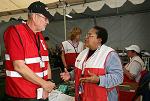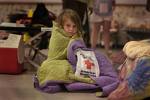Summer is winding down and people are starting to settle into routines.
For the Red Cross, our routine includes being trained and prepared in order to respond to disasters and other life-threatening emergencies 24 hours a day, 365 days a year. Disasters can happen at any place and time – holidays, while on vacation, at work, commuting around the region or at home to name a few. There are thousands of Red Cross volunteers ready to help, and we need more!
Have you wondered about how the Red Cross helps in times of disasters?
Do you have an interest in learning how to help the people in your community?
Are you able to dedicate some time in your schedule to join a team?
Why not become a volunteer?!
Click here to visit our web site to learn about how to volunteer.
Click here to learn about our FREE Red Cross disaster training courses.
Invite your family, friends, colleagues and community members to volunteer and attend training with you. You can learn together and be prepared!


![10267-1489tn[1] 10267-1489tn[1]](https://redcrossnca.files.wordpress.com/2009/07/10267-1489tn11.jpg?w=150&h=111)
